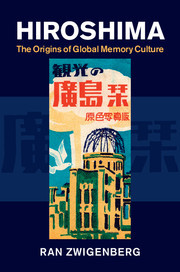Description
Hiroshima
The Origins of Global Memory Culture
Author: Zwigenberg Ran
An original and compelling new analysis of Hiroshima's place within the global development of Holocaust and World War II memory.
Language: English
Subject for Hiroshima:
Approximative price 107.81 €
In Print (Delivery period: 14 days).
Add to cart
Hiroshima
Publication date: 09-2014
Support: Print on demand
Publication date: 09-2014
Support: Print on demand
Approximative price 38.06 €
In Print (Delivery period: 14 days).
Add to cart
Hiroshima
Publication date: 02-2016
Support: Print on demand
Publication date: 02-2016
Support: Print on demand
Description
/li>Contents
/li>Biography
/li>
In 1962, a Hiroshima peace delegation and an Auschwitz survivor's organization exchanged relics and testimonies, including the bones and ashes of Auschwitz victims. This symbolic encounter, in which the dead were literally conscripted in the service of the politics of the living, serves as a cornerstone of this volume, capturing how memory was utilized to rebuild and redefine a shattered world. This is a powerful study of the contentious history of remembrance and the commemoration of the atomic bomb in Hiroshima in the context of the global development of Holocaust and World War II memory. Emphasizing the importance of nuclear issues in the 1950s and 1960s, Zwigenberg traces the rise of global commemoration culture through the reconstruction of Hiroshima as a 'City of Bright Peace', memorials and museums, global tourism, developments in psychiatry, and the emergence of the figure of the survivor-witness and its consequences for global memory practices.
Acknowledgements; Introduction; 1. 'The most modern city in the world': city planning, commemoration and atomic power in Hiroshima, 1945–55; 2. Modernity's angst: survivors between shame and pride: 1945–60; 3. Socialist bombs and peaceful atoms: exhibiting modernity and fighting for peace in Hiroshima, 1955–62; 4. Healing a sick world: Robert Lifton, PTSD, and the psychiatric reassessment of survivors and trauma; 5. The Hiroshima Auschwitz Peace March and the globalization of victimhood; 6. A sacred ground for peace: violence, tourism and the sanctification of the Peace Park, 1963–75; 7. Peeling the red apple: the Hiroshima Auschwitz Committee and the Hiroshima-Auschwitz museum, 1973–95; Conclusion: the other ground zero? Hiroshima, Auschwitz, 9.11 and the world between them; Index.
Ran Zwigenberg graduated in history from Hunter College, City University of New York, after which he went to work for the United Nations. He recently finished his PhD in history at the Graduate Center of the City University of New York. Zwigenberg's research focuses on modern Japanese and European history, with a specialization in memory and intellectual history. He has published on issues of war memory, atomic energy and survivor politics, and has won numerous fellowships including from the Japan Foundation, the Social Science Research Council's IDRF fellowship, and the ACLS dissertation completion award. He has presented his work in Israel, Europe, the US and Japan. Zwigenberg is currently Assistant Professor in History and Asian Studies at Pennsylvania State University.
© 2024 LAVOISIER S.A.S.




